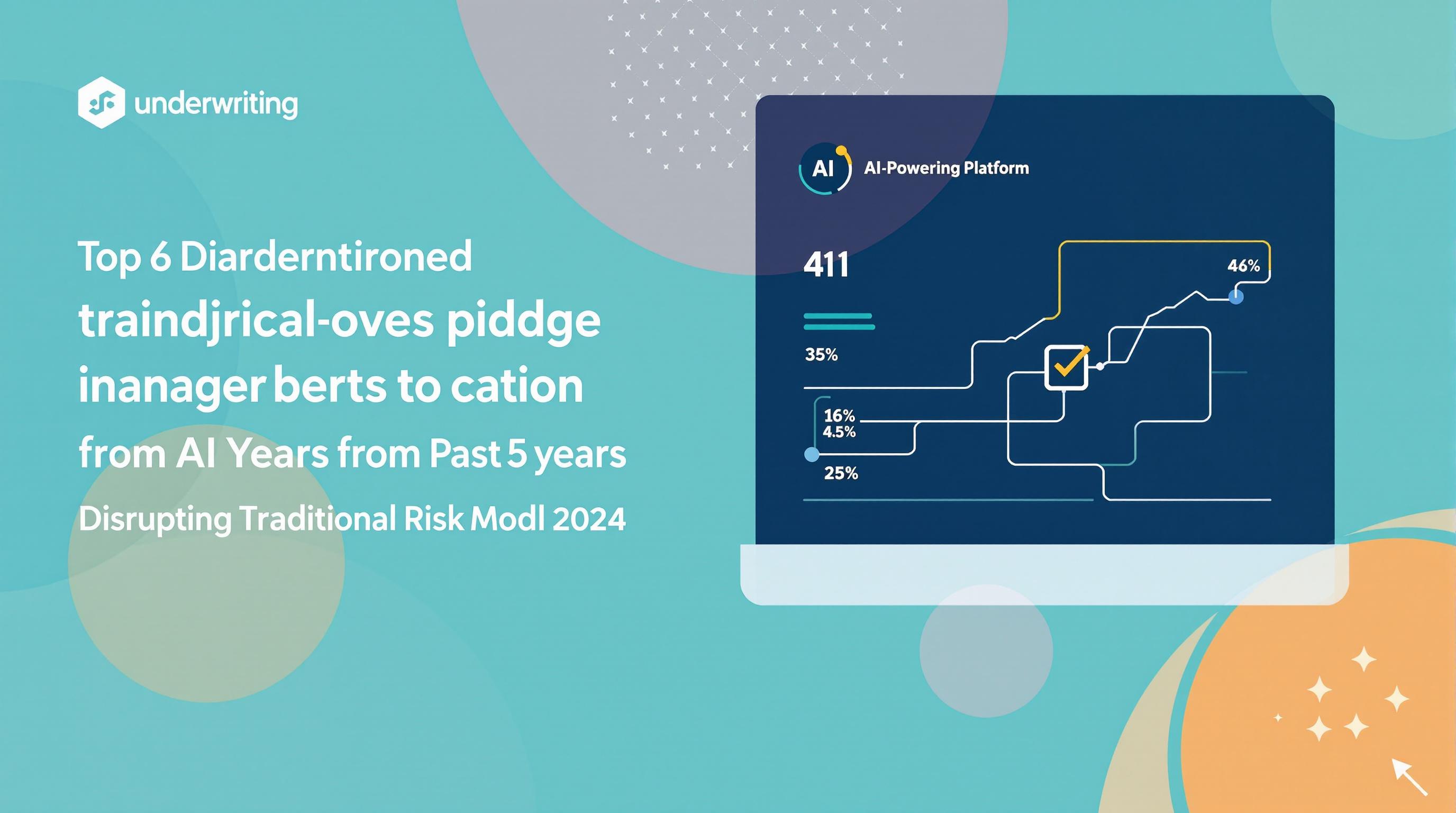Related Articles
- Top 6 AI-Powered Underwriting Platforms from the Past 5 Years Disrupting Traditional Risk Models in 2024
- How Uncommon Insurance Amendments Influence Unexpected Claims and Shape Policyholder Behavior in Quiet Corners
- 7 Underrated Indexed Insurance Products from the Last 5 Years That Outsmart Traditional Plans
- Unveiling the Role of Universal Life Insurance in Protecting Digital Legacies and Cryptocurrency Estates
- Top 6 Under-the-Radar Group Insurance Plans Since 2019 Redefining Employer and Employee Value
- How Childhood Genetics Influence Insurance Premiums and What Parents Rarely Know About Policy Risks
9 Critical Insurance Underwriting FAQs Every Policyholder Should Ask to Navigate Complex Risk Assessments Confidently
9 Critical Insurance Underwriting FAQs Every Policyholder Should Ask to Navigate Complex Risk Assessments Confidently
9 Critical Insurance Underwriting FAQs Every Policyholder Should Ask to Navigate Complex Risk Assessments Confidently
Understanding insurance underwriting can seem daunting, but it's crucial for policyholders to engage with the process proactively. Insurance underwriting involves evaluating risks to determine coverage eligibility and premium costs. This article addresses nine frequently asked questions that empower you to navigate underwriting confidently.
1. What Is Insurance Underwriting and Why Is It Important?
Insurance underwriting is the process by which insurers evaluate the risks associated with a potential policyholder to decide whether to offer coverage and at what price. Underwriters assess various risk factors to protect the insurer from unanticipated losses.
It also ensures fair pricing; by balancing risk, insurers can provide policies that are affordable for many while maintaining financial stability. For policyholders, understanding this process helps set realistic expectations about premium costs and coverage terms.
Overall, underwriting is the backbone of the insurance industry, maintaining its viability and consumer trust by managing risk prudently. Engaging with this process knowledgeably puts you in a better position to discuss your policy.
2. How Do Underwriters Assess Risk?
Underwriters gather and analyze detailed information about the applicant, such as medical history, occupation, lifestyle, and property condition, depending on the type of insurance. They also consider statistical data and predictive models to estimate the likelihood of a claim.
For health and life insurance, factors like age, smoking status, and family medical history are critical. In property insurance, building materials, location hazards, and security measures are examined. This multi-faceted evaluation helps identify potential exposures that affect risk.
Ultimately, this assessment shapes the pricing and terms of the policy. Policyholders can benefit by providing accurate, comprehensive information, which helps avoid delays or denial later due to misrepresentation.
3. What Factors Can Lead to Coverage Denial During Underwriting?
Coverage denial can occur if the applicant poses a risk beyond the insurer's threshold. Common causes include undisclosed medical conditions, hazardous occupations, poor property maintenance, or risky behaviors like smoking or extreme sports participation.
Sometimes, underwriting guidelines are strict due to regulatory or actuarial reasons, limiting coverage for certain profiles. Additionally, incomplete or inaccurate information on the application can trigger denial or rescission of coverage.
Being transparent and thorough when answering underwriting questions is essential. If denied, you have the right to request an explanation and seek alternative insurers or coverage options tailored to your risk profile.
4. How Can I Improve My Chances of Approval?
Improving your underwriting prospects starts with honesty and preparation. Before applying, review your health records, credit history(if applicable), and property condition, addressing any issues where possible.
For health insurance, adopting healthier habits, such as quitting smoking and managing chronic conditions, can reduce risk. For property insurance, installing safety features like smoke detectors and security systems helps demonstrate risk mitigation.
Additionally, consider working with an experienced insurance agent who understands underwriting criteria and can help tailor applications to highlight your strengths and mitigate weaknesses.
5. What Role Does My Application Accuracy Play in Underwriting?
Application accuracy is paramount. Incorrect or incomplete information can delay underwriting, lead to inaccurate risk assessment, or result in coverage denial. Underwriters rely heavily on the details you provide to make decisions.
Misrepresenting facts, whether intentional or accidental, can be grounds for policy cancellation or claim denial later. Providing truthful, complete answers ensures smoother processing and stronger policy integrity.
Before submitting an application, double-check all entries, ask questions if unsure, and keep documentation handy to support your answers. This vigilance supports a transparent underwriting process and safeguards your coverage.
6. How Long Does the Underwriting Process Typically Take?
The duration of underwriting varies based on policy type, complexity of risk factors, and insurer workload. Simple policies, like standard auto insurance, may render decisions within hours or days.
More complex underwriting, such as life insurance with detailed medical exams, can take weeks. Delays may arise if additional information or documentation is required, or if third-party reports need processing.
Staying responsive to insurer requests and providing timely information can expedite the process. Your agent can also help monitor progress and communicate any updates or concerns efficiently.
7. Can I Appeal an Underwriting Decision?
Many insurers allow policyholders to appeal underwriting decisions if they believe an error was made or new information is available. The appeals process usually involves submitting additional documentation or explanations for reconsideration.
For example, medical records showing improved health or evidence of risk mitigation efforts can influence a change in stance. It's important to review the insurer's appeal policy promptly and prepare a clear case.
If appeals are unsuccessful, you may explore other insurers with different underwriting standards or specialized programs geared toward higher-risk applicants. Persistence and thoroughness can often lead to coverage opportunities.
8. How Does Underwriting Affect My Premiums?
Underwriting directly influences the premium you pay. Higher risk profiles generally lead to increased premiums or additional coverage exclusions. Conversely, favorable underwriting findings can yield discounts or preferred rates.
Premiums reflect the insurer’s assessment of probability and potential severity of claims. Accurate underwriting helps align your premium cost with your true risk, ensuring fairness and affordability over time.
Understanding the underwriting basis for your premium allows you to make informed decisions about coverage levels and risk management strategies, potentially lowering costs through demonstrated improvements.
9. Where Can I Learn More About Insurance Underwriting?
Educating yourself about underwriting enhances your confidence in navigating insurance decisions. Resources include insurer websites, state insurance department publications, and reputable industry organizations such as the National Association of Insurance Commissioners (NAIC).
Books and online courses about insurance principles can provide deeper insights. Additionally, professional agents and brokers are valuable sources to explain underwriting specifics tailored to your situation.
Taking proactive steps to understand underwriting empowers you to advocate for your coverage needs effectively and avoid surprises during claims or policy renewals.
Sources:
National Association of Insurance Commissioners. "Understanding Insurance Underwriting." NAIC.org.
Insurance Information Institute. "How Underwriting Works." III.org.




